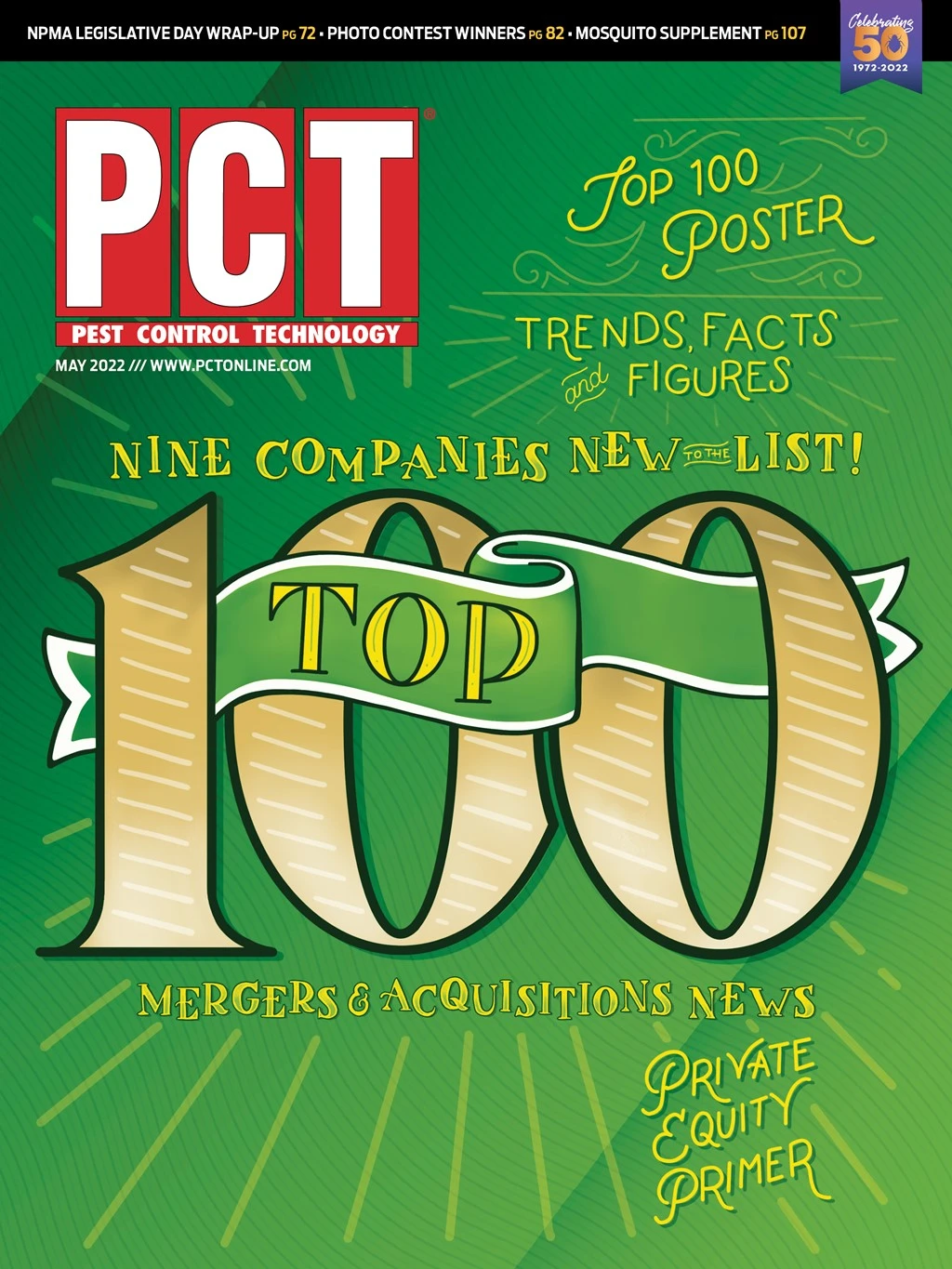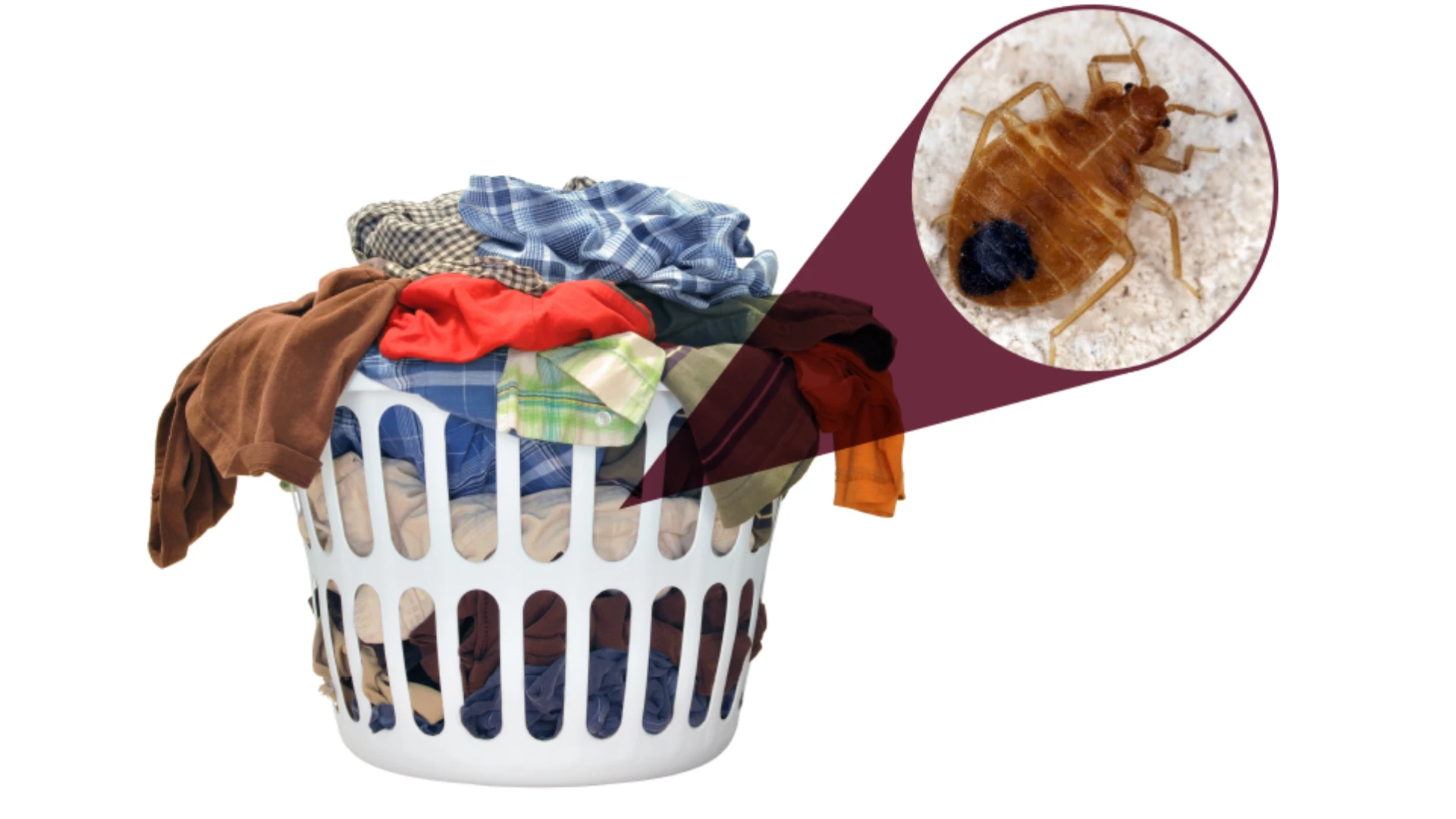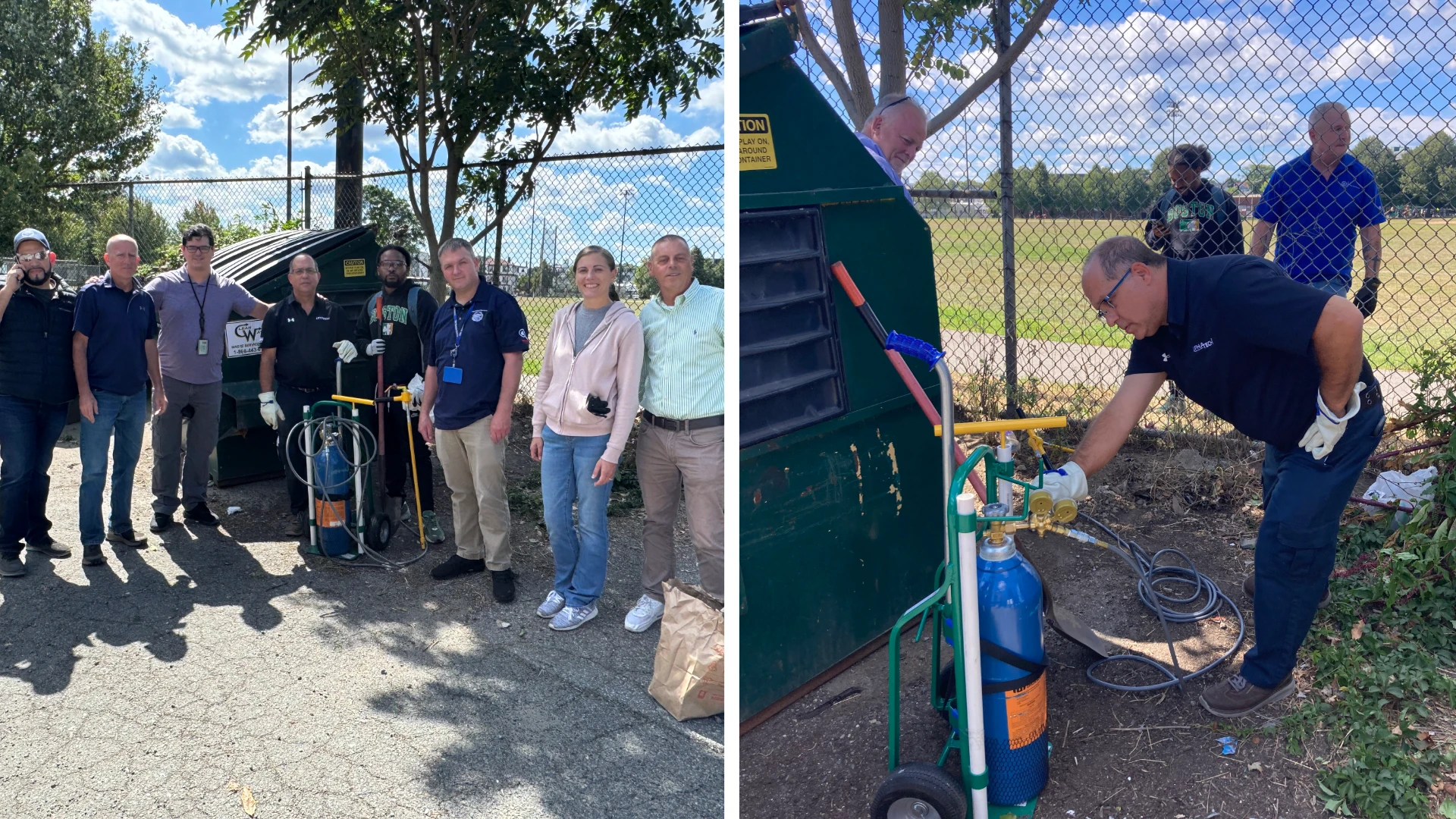

Naming things can be a crapshoot. There’s no telling where the zeitgeist will take us five, 10 or 30 years down the road. Just ask any expectant parent. You don’t see a lot 20-something Errols or Humphreys running around these days, after all. (If your name is Errol or Humphrey, we owe you a beer.)
Naming businesses isn’t any easier. For every Twitter or Microsoft, there’s a KFC or Dunkin’, which some analysts agree changed their names partially because of the unhealthy associations with the words fried chicken and donuts, respectively.
In the pest control industry, a name change can happen for any number of reasons, such as being acquired or discovering there’s a company with a similar name in a region that you’re working in, or one that you’re thinking of expanding into.
That latter example happened to Armor Pest Defense last year. The company, which is No. 98 on this year’s Top 100, was founded in 2010 by Shon Gregerson and his brother-in-law Morgan Spillet.
After 11 years of door-to-door sales, the company reached 18,000 customers across six states: Colorado, Arizona, Kansas, Missouri, Ohio and Oklahoma, good enough for a No. 90 showing on last year’s Top 100. Gregerson said the company was looking to expand further but began to discover other pest control companies using the Armor moniker.
“We came up with 33 other companies that use Armor,” he said. “Most of those were in states we’re not in, but a lot of states won’t let you in if somebody’s got the same name.”
After reviewing thousands of potential names using both real and made-up words — then coming up with variations of those words — Gregerson and the company’s five other partners eventually settled on Aimvo Pest Control, which it launched this year.
“It was a nightmare,” Gregerson said with a laugh. “We started originally looking at words that aren’t used in pest control, such as gravity. Some were really good names. Then you look them up, and there’s a pest control company with that name!”

Aimvo, nee Armor, isn’t unique in the new name game. This spring, Utah-based Edge Pest Control, which is No. 21 on this year’s list, changed its name to Saela Pest Control as a result of what it called “a proactive choice born out of the desire to give the company a name that authentically portrays what it is and aspires to be,” according to a press release.
The former Edge Pest Control, which services accounts throughout the nation, was founded by Andrew Richardson in 2008 and now has branches in Colorado, Idaho, Illinois, Kansas, Missouri, Oregon, Tennessee, Texas, Utah and Washington. So why switch from a familiar name to something new after nearly 15 years in business?
Richardson said he felt Edge was too common a name in the business world. He wanted his company’s brand to stand out from the crowd and more accurately represent its values and mission: “We lift. We create. We make it last.” That’s why, with the help of a marketing and advertising agency and about two years of rebranding discussions, Richardson and his team landed on Saela — an Old Norse word meaning “happiness” that ties into the company’s goal of helping customers live their happiest lives, pest free.
“I believe by retiring the Edge brand, we’ll have far more control in who we say we are and how we are remembered,” said Richardson. “This is an important step to reach the goals we’ve set for the next few years and in becoming a long-lasting, profitable organization.”
And with so much going on in the mergers and acquisitions space in pest control, it’s likely more companies — acquirers, acquirees or firms just looking to shake things up — will be wrestling with the same choices Richardson and Gregerson made.
“It was a huge process,” Gregerson said. “Everybody was emotionally tied to Armor. It’s built a lot of lives over the years, so it’s hard to give that up.”
ALTHOUGH COMPANIES such as Saela and Aimvo are changing their names for competitive or other reasons, most name and/or brand changes likely occur because of the red-hot mergers and acquisitions market.
Scott Steckel, director of strategic development at Plunkett’s Pest Control/Varment Guard Wildlife Services (No. 17 on this year’s list), experienced this firsthand a few years ago. His company, Varment Guard, was bought by Plunkett’s in 2018.
“Plunkett’s was 100 years old [at the time], and we were 27 years old,” Steckel said. “They were a $42 million company, we were at $8 million, and we didn’t have the same territory, so the math is there.”
Because Varment Guard’s footprint was pretty big, covering Ohio, Michigan, Indiana, Kentucky, West Virginia and Pennsylvania, they kept the Varment Guard brand name. But that first year, customer feedback flooded in: “This is just confusing. Who are you? Are you Varment Guard? Are you Plunkett’s?”
“They were seeing advertising for one, and advertising for another,” Steckel said. “They saw uniforms for one, uniforms for the other. It was kind of a hodgepodge. Customers said, ‘Please pull the Band-Aid off and make it one name.’ ”
The company decided to do a restructuring of sorts. Varment Guard became the place to go for wildlife issues, Plunkett’s for general pest control. It worked out.
“Our branding started to kind of resonate better,” Steckel said. “We have customers [who] clearly know who they were calling and what their service was, and they were telling us that from that perspective, it was actually resonating with them more.”
Moving forward, Plunkett’s/Varment Guard set up more defined processes for whether to rename companies it would acquire, which it has recently been very active in, Steckel said. The company acquires one or two companies a month, he estimated.
For example, Plunkett’s acquired Carter Pest Services in early 2021. The company, which was founded in 1980, serviced parts of New Mexico, Texas and Colorado. Because of that sizable footprint, Plunkett’s left the Carter brand name in place while slowly transitioning general pest control services to Plunkett’s and wildlife to Varment Guard.
If the company only serviced an area the size of a city, such as Pittsburgh, Pa., the name would be changed immediately to Plunkett’s or Varment Guard, depending on services offered.
“You have to ask yourself, from a geographical pull-in, customer retention point of view, does it add value to keep the name?” Steckel said. “If it’s regional versus just offering services in a city, and it has more of a pull, helping us get deeper into that territory, then we leave the name in place for several months.”

Kevin Smith, chief marketing officer at Rollins, agrees for the most part. But his company, which is No. 1 on the PCT Top 100, takes a more nuanced approach. For example, since the company has a portfolio of brands, such as IFC, Northwest Exterminating and Western Pest Services, it might make more sense to add newly acquired companies to one of those brands.
But if a brand has a unique selling proposition, owns its geography or the owners want to stick around and run the company, Rollins might leave it alone name-wise.
“As long as that brand grows faster or as fast as the rest of the portfolio, then there probably is no reason to change that name,” he said.
From his perspective, Smith also wondered how important a name really is.
“We probably get way too carried away with what the name of the company is,” he said. “We do research on this. Customers often can’t remember the name of the company they’re doing business with.”
Instead, Smith pointed out the importance of technicians.
“The value that our technicians provide every day, and that customer experience that they deliver, builds the strength of that brand — not any marketing,” he said. “It’s not anything fancy. It’s all about the value you generate with the service that you just provided for that customer.”


GREGERSON AND HIS PARTNERS, which include his dad Jerry (the company’s CEO) and his brother Chris, among others, were looking for a name that was short, simple and phonetically sound. The name they landed on, Aimvo, also loosely translates to “higher worth” when translated from English to Greek.
“We thought, Wow, that’s cool,” he said. “Because we aren’t just changing the name, we’re revamping everything to be a better company for our employees, customers and communities.”
After 12 years in business, Aimvo is kind of like a phase two for Gregerson’s company. The firm started phase two with a mission statement, which it had not had prior, of providing opportunities and peace of mind. The opportunities and peace of mind extend to both customers and employees. Everybody in the company got a raise, full medical benefits and a 401(k) program.
The company also moved into a new headquarters in Blackfoot, Idaho. Last November, the company moved out of its old 2,200-square-foot office into an 18,000-square-foot building, which it bought with cash.
“Now we have room to grow,” Gregerson said. “We had eight people in customer service; now we’ve got room for more than 30 cubicles for customer service reps alone.”
The name change is also part of the company’s expansion into online marketing. Prior to this, the company just focused on door-knocking. What Gregerson didn’t want to happen is the online push sending leads to other firms named Armor.
“Armor is a great name, and it’s done a really good job for us for the last 12 years,” Gregerson said, “but we’ve outgrown it.”

Explore the May 2022 Issue
Check out more from this issue and find your next story to read.
Latest from Pest Control Technology
- Rentokil Terminix Expanded in Key Markets with 2024 Acquisitions
- In Memoriam: Joe Cavender
- Certus Acquires Green Wave Pest Solutions
- Liphatech Adds Alex Blahnik to Technical Team
- Do the Right Sting: Stinging Insect Identification, Management, and Safety
- VAGA's 8th Annual Veterans Thanksgiving Appreciation Dinner
- Clark's Blair Smith on the Response to Increased Dengue Fever Cases in Southern California
- WSDA, USDA Announce Eradication of Northern Giant Hornet from U.S.





